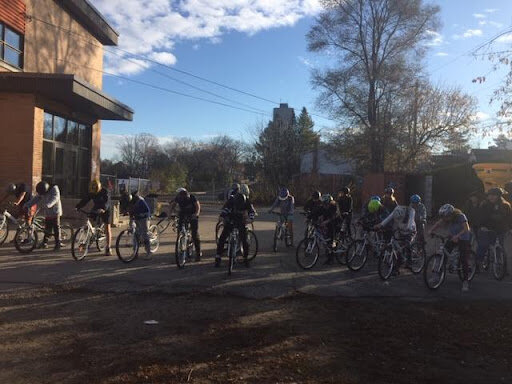Waiting for the Great Leap Forward
Originally published on OLEVI | December 1, 2020
On March 13, 2020, schools across Canada closed their doors to help stop the spread of Coronavirus. The nation-wide lockdown was unprecedented in scale and forced all school systems to stop traditional in-school teaching and transition to on-line learning.
Then astonishingly, on April 30th, the Quebec government announced that all schools in the province would reopen on May 11th. Staff and parents were shocked, as Quebec was experiencing the highest rate of confirmed Covid cases in the country (and the same number of Covid related deaths as the rest of the country combined). In the end, the government decided not to reopen schools in Montreal and Quebec City. However, schools within the Western Quebec School Board embarked on the unenviable task of being among the first schools in North America to reopen and reimagine a new school organizational plan in the middle of a global pandemic.
When schools did reopen in May, most parents were fearful of the pandemic and decided to keep their children home. Unsurprisingly, only 15% of the school board’s 4,000 elementary students returned to school in the spring of 2020.
The prospect of returning to school for staff was alarming. They were naturally concerned and fearful of potential health risks of returning to the building. As expected, there were high levels of stress and anxiety regarding the anticipated return. However, within a few days of being back, the fear and anxiety began to subside and, thankfully, life at school started to feel normal again. This experience allowed parents to feel confident in the staff’s ability to keep students emotionally and physically safe while at school.
When Pierre Elliott Trudeau Elementary School (PETES) in Gatineau reopened, the school administration had to rethink the entire educational landscape. “No matter how dark our circumstances may appear at the moment, the chaos and complexity that we experience are prerequisite to the creation of new knowledge (Glieck, 1987, p. 179)”. Upon reflection, reopening our school in the spring may have been the catalyst for a major shift in our educational thinking.
When returning to school in May, our guiding principle was quite simple - create a safe and healthy environment at school for students and staff. Since epidemiologists claimed outside was 20 times safer than inside, we thought that moving learning outdoors was just a matter of common sense. Little did we know that was not necessarily the norm elsewhere? Our mantras were clear - “think and organize differently”, “give students a break from technology” and “take the learning outdoors”. At year-end, we discovered several unexpected health and learning benefits from taking the learning outdoors.
Students were more at ease when starting each morning exercising outdoors
Students and staff were more relaxed and patient with the removal of school bells
There were less disturbances when classes would enter and exit the building as a single group (instead of a surge at bell time)
Staggering class recess times and creating designated class play zones allowed for more calm and peace on the playground
Taking the learning outdoors not only benefitted our emotionally unregulated students but it benefitted all students
Relationships between students and staff improved when classes took place outdoors
Teachers became more creative with lesson plans and learning intentions when using the outdoors as their classroom
Staff and students experienced technology fatigue during isolation and embraced the low-tech outdoor philosophy
Learning through play and nature allowed all students to be available for learning for longer periods of time
In Canada, May is a widely celebrated time of year as we emerge from our winter hibernation. The timing of our return to school was really a blessing in disguise. The anticipated return of warmer weather coupled with the approaching summer holidays allowed teachers to end their school year on a very positive note. The summer also gave the teaching staff, principal and vice principal time to reflect on the lessons learned from the new school organizational plan, and adopt best approaches and practices for the fall.
Throughout the summer in North America, the prevailing narrative from schools that did not return in the spring was one of fear, anxiety and discord. Ministry of Educations, unions and parent groups expended their energy disagreeing over a safe return to school plan. Their battleground was drawn between virtual school and in-person schooling with reduced class sizes.
At the Western Quebec School Board (WQSB), conversations throughout the spring and summer centred on how to improve teaching and learning during a pandemic school year. The confidence gained from our successful return to school inspired more innovative thinking and really gave us an advantage upon returning to school in the fall. “If we believe that the most powerful learning occurs on the edge of chaos, then we view disorder, unpredictability, and confusion with a different mindset” (Brown & Moffat, 1999, p. 21).
While on summer holidays, the principal at PETES had the idea of purchasing three large marquee wedding tents to be used as temporary outdoor classes. He purchased them in July because he was worried about a shortage of tents in September. He also had the idea of asking a local construction company to build natural log seating. The tents quickly became the talk of the town as they created safe outdoor learning spaces for students and staff.
Successful teaching strategies and practices of outdoor learning tested in the spring continued in the fall. Staff committed to having a minimum number of periods taught outside each day. The outdoor health benefits in a Covid era were obvious, but the enhanced learning benefits were unexpected. As more classes moved outdoors, more ideas came forward. By having a positive outlook about the return to school, we were able to “see problems as threats and also as sources of creative resolution” (Fullan, 1993, p. 22).
With the elimination of school activities (clubs, sports, music, etc.) due to Covid protocols and restrictions, we became increasingly worried that the diminishing educational experience for students could have an impact on their emotional well-being and their motivation for learning. As such, we collaborated with our parent association, wrote grants, and invested from our school budget to purchase class sets of bicycles, scooters, snowshoes, and ice skates. Providing students and staff with opportunities to participate in healthy, fun, outdoor activities has had major health and learning benefits this year.
These activities initially brought an element of fun and adventure to the school day. Not only were students happy, engaged and excited to be at school, but also they felt safe in the sanctuary of their attachment to their teacher and the protective bubble of play. What is truly remarkable about true play is the “incredible emotional work that is happening under the rather innocuous and playful camouflage of being up to nothing” (Neufeld, 2020).
The greatest academic benefit we found was that teachers were reporting an increase in student focus and attentiveness to their studies after participating in playful outdoor activities. The school is conducting research this year to qualify the thesis - “Does moving class and playful activities outdoors enhance the quality of teaching and learning?”
At the time of writing (December 7th), we are currently having our most successful year in recent history in terms of positive school ethos. The key to our success has been simple: “Change the narrative from fear and anxiety and search for positive, optimistic, safe, fun, and innovative ideas”. Our entire school community has been supportive, and we are happy to announce that after three months at school we have yet to record a positive case of Covid (school population of 560).
Throughout the school year, we have received considerable local and national media attention for our approach to “outdoor learning in a Covid year”. We have now received international attention as the school recently featured on the weekly BBC 4 radio podcasts “Health Check” and “From our own Correspondent”. In all honesty, the idea of an “outdoor approach to teaching and learning” and “having fun at school in a Covid year” just seems so obvious. However, if BBC thinks that this is internationally newsworthy, maybe it is not so obvious to everyone.
Our philosophy of school organization has changed dramatically over the past nine months. At first glance, one would assume that the future of education would inevitably feature a greater reliance on the integration of technology in a digital world. However, if we take a second glance, we will realize this may not necessarily be the case.
What we have learned over the past nine months is that elementary aged children need and crave a sense of togetherness from in-person schooling. Meanwhile, we have also learned that herding masses of students and staff together into a physical building for seven hours a day can present serious health risks. To quote the English singer songwriter Billy Bragg, “Here is the future and you can’t run from it….we’re waiting for the great leap forward”.
Perhaps the future of education is more than imbedding further integration of technology. As we continue to observe an increase in children’s screen time and their reduced time in nature, it may become an imperative for education systems to adapt and reimagine school organization. Perhaps what is required for the future of education, in a mid and post-pandemic world, is a more “Back to Basics” approach. Which may in fact require schools to implement a system-wide plan to focus on learning outdoors through play and nature. In the end, the obstacle is merely our imagination.
Facilitating healthy child development in an optimal outdoor learning environment could encourage a shift in educational thinking, and maybe just maybe inspire that….Great Leap Forward.
BBC World Service - Health Check, Measles outbreak threat due to Covid (11 minute mark)
From Our Own Correspondent - Facing defeat in Nagorno-Karabakh - BBC Sounds (17 minute mark)
Classes move outdoors to prevent COVID-19 spread - The Globe and Mail








